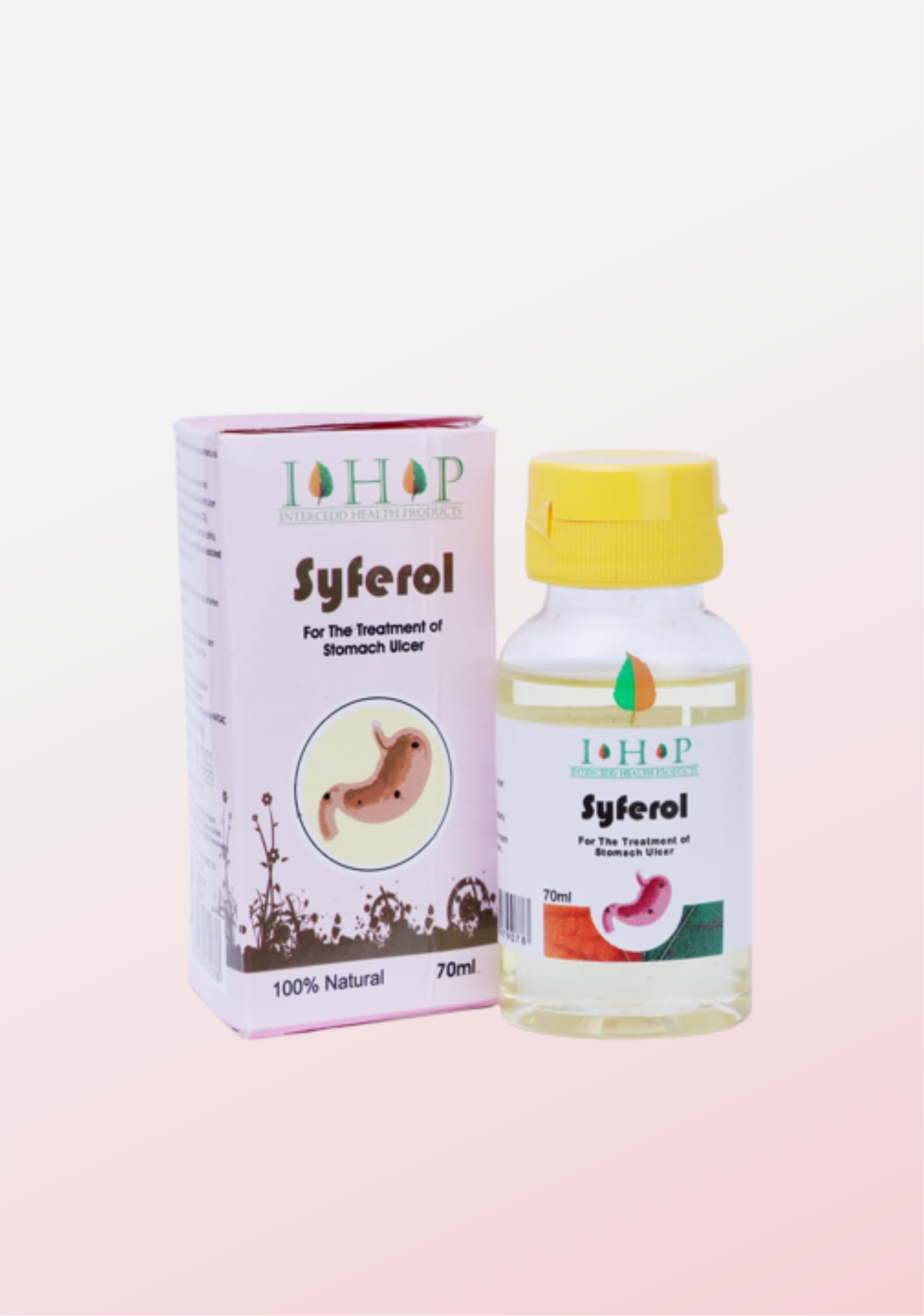Syferol | A Natural Remedy for Ulcer Pain Relief
Stomach ulcers are a surprisingly common condition, affecting millions of people worldwide. These painful sores that develop in the lining of your stomach can make everyday activities a chore. The burning, gnawing discomfort can disrupt your sleep, limit your appetite, and leave you feeling constantly on edge.
Fortunately, there are options beyond just traditional medications for managing ulcer pain. Syferol, a natural remedy, has emerged as a promising solution for many seeking relief. Syferol harnesses the power of nature to soothe and support the digestive system, promoting a return to comfort.
This article dives deep into Syferol, exploring its potential benefits and effectiveness in combating ulcer pain. We’ll uncover the science behind this natural remedy and examine how Syferol can help you get back to feeling your best.
Key Point:
1. Stomach ulcers are a common condition affecting millions worldwide.
2. Syferol, a natural remedy, offers relief from ulcer pain by soothing the digestive system.
3. Different types of ulcers exist, including stomach and duodenal ulcers.
4. Causes of ulcers include H. pylori bacteria, pain relievers, and stress.
5. Symptoms of ulcers include burning pain, nausea, bloating, and weight loss.
Understanding Ulcers
Ever felt a gnawing pain in your stomach that just won’t quit? It could be an ulcer, a pesky open sore that forms on the lining of your stomach or upper intestine. But ulcers aren’t all created equal. There are a few different types:
- Stomach ulcers, also called gastric ulcers, are the most common. These bad boys take root right in the stomach lining.
- Duodenal ulcers hang out in the upper part of your small intestine, just past the stomach exit.

image source: storck
Causes and risk factors
So, what causes these unwelcome guests? Well, the blame often falls on a sneaky bacteria called Helicobacter pylori (H. pylori for short). This little bug can irritate the lining, making it more susceptible to damage from stomach acid.
But H. pylori isn’t the only culprit. Regular use of pain relievers like ibuprofen or aspirin can also weaken the stomach lining, increasing your ulcer risk. Spicy foods might seem like a trigger, but research doesn’t definitively link them to ulcers. Stress, however, can play a role.
Symptoms and complications
Now, how do you know if you’ve got an ulcer? The burning pain in your upper abdomen is a telltale sign, especially if it comes and goes on an empty stomach or at night. You might also experience nausea, bloating, burping, or even weight loss.
If you’re experiencing these symptoms, don’t ignore them. Ulcers, while uncomfortable, can usually be treated effectively. Talking to your doctor is the first step to getting the relief you deserve.
Conventional Treatments for Ulcers
Ulcers, those unwelcome stomach guests, can leave us feeling miserable. But fear not, there are ways to fight back! Doctors have a whole arsenal of conventional treatments at their disposal, and let’s break them down together.
First up, medications. If you’ve ever dealt with heartburn, you might already be familiar with proton pump inhibitors (PPIs). These are superstars at reducing stomach acid, giving your ulcer a chance to heal peacefully. There are also H2 blockers, another medication type that helps put the brakes on acid production. But sometimes, the culprit behind ulcers is a sneaky bacteria called H. pylori. If tests show you have this unwanted passenger, your doctor might prescribe antibiotics to banish it for good.
Now, medication isn’t the only option. In some cases, surgery might be recommended. This is usually for severe ulcers or those that keep coming back. The good news is that advancements in technology have made these procedures minimally invasive, meaning quicker recovery times.
However, conventional treatments aren’t perfect. Medications can come with side effects like headaches or constipation. Surgery, while effective, carries inherent risks and requires some downtime. That’s why many people are exploring alternative approaches alongside conventional treatments, and that’s where natural remedies like Syferol come in.
Exploring Syferol and What is it?
So, Let’s go into the fascinating world of Syferol. So, what exactly is Syferol? Well, it’s a natural remedy derived from specific plant extracts, carefully crafted to combat ulcer pain. The journey of Syferol begins with its origin, deeply rooted in the rich heritage of herbal medicine.
Syferol is formulated with specific ingredients chosen for their well-researched benefits. We’re talking about things like licorice root, known for its stomach-soothing properties, and maybe even some calming chamomile. Each ingredient plays a specific role. Licorice root, for instance, helps create a protective barrier in your stomach lining, while chamomile might ease inflammation that contributes to the discomfort.
Now, let’s break down its components and how they operate within our bodies. Syferol comprises a blend of botanical extracts, each carefully selected for its potential to soothe ulcer discomfort. These components work synergistically to target the root cause of ulcers, providing relief and promoting healing. But why should we trust Syferol? Let’s turn to the scientific evidence backing its efficacy. Numerous studies have delved into the therapeutic properties of Syferol, highlighting its ability to reduce inflammation and promote ulcer healing. These findings offer compelling support for Syferol as a viable option in the realm of natural ulcer remedies.
How to Use Syferol
Here’s a step-by-step guide on how to use Syferol, along with details on other available options:
1. Dosage Recommendations:
– Syferol typically comes with dosage recommendations based on the severity of the ulcer and individual health factors.
– Follow the instructions provided on the packaging or by your healthcare provider closely.
– Dosage may vary, so it’s crucial to adhere to the recommended amount to achieve optimal results.
2. Administration Methods:
– Capsules: If you’re using Syferol capsules, swallow them whole with a glass of water, as directed.
– Liquid Extracts: For liquid Syferol extracts, you might need to mix them with water or juice before consumption. Ensure you shake the bottle well before pouring it to distribute the contents evenly.
– Other Options: Depending on availability, Syferol may also be available in other forms such as tablets or powders. Follow the specific instructions provided for these formulations.
3. Safety Precautions and Potential Interactions:
– Consultation: Before starting any new supplement regimen, including Syferol, it’s essential to consult with your healthcare provider. They can offer personalized advice based on your medical history and current medications.
– Precautions: While Syferol is generally considered safe for most individuals, it’s essential to be aware of potential allergic reactions or side effects. If you experience any adverse effects, discontinue use and seek medical attention.
– Interactions: Be cautious of potential interactions between Syferol and other supplements or medications you may be taking. Your healthcare provider can help you identify and manage any potential interactions to ensure your safety.
Benefits of Syferol for Ulcer Pain Relief
Syferol: My Experience with Natural Ulcer Relief

Listen, stomach ulcers are no joke. The constant gnawing pain can make you want to crawl under the covers and forget the world exists. But there’s good news! I discovered Syferol, a natural remedy that’s been a game-changer for me. Let me tell you how it’s helped.
Firstly, Syferol seems to be a champion for pain reduction. I used to dread mealtimes because the burning would kick in almost instantly. But with Syferol, that discomfort has lessened significantly. It’s not a magic bullet, but it takes the edge off that awful pain, making it much more manageable.
Beyond just numbing the pain, Syferol feels like it’s helping my ulcers heal. I’ve read about its potential to promote tissue repair, and I have to say, it feels like that’s happening. I’m not experiencing those intense flare-ups as often anymore, and there’s a noticeable difference in the overall discomfort level.
Another big thing for me is that Syferol seems to address the underlying inflammation that can contribute to ulcers. Do you know that feeling like your stomach lining is on fire? Syferol seems to calm that down. It’s like it helps my gut chill out, which makes a huge difference in how I feel overall.
Now, I’m not a doctor, and this is just my personal experience. But for me, Syferol has been a fantastic addition to my ulcer management routine. It’s helped with pain relief, seems to be promoting healing, and addresses that pesky inflammation. If you’re struggling with ulcers, it might be worth checking out and seeing if it helps you too!
Comparing Syferol with Traditional Medications
Ulcer pain can be debilitating, and medications are often the first line of defense. But what if there was another option? Syferol, a natural remedy, has entered the ring, promising relief without the potential side effects of traditional medications. So, which path should you take? Let’s break it down.
Effectiveness: Punching Through the Pain
Both traditional medications and Syferol aim to reduce stomach acid, a major culprit in ulcer pain. Medications often work quickly, providing near-instant relief. Syferol might take a bit longer, but some users report significant pain reduction within days. Here’s the kicker: medications address symptoms, while Syferol might offer a longer-term solution.
Safety in the Ring: Weighing the Side Effects
Traditional medications can come with a not-so-fun side effect party. Think of headaches, nausea, and diarrhea. Syferol, on the other hand, is generally well-tolerated. Of course, it’s always wise to talk to your doctor before starting anything new, but Syferol’s natural profile might be a welcome change.
Going the Distance: Long-Term Benefits
Medications often mask the problem, not solve it. Once you stop taking them, the pain can return. Syferol, with its natural ingredients, might promote gut health and support the digestive system’s natural ability to heal itself. This could lead to lasting relief and a reduced risk of future flare-ups.
Think of it this way: traditional medications are like putting a bandaid on a wound. Syferol might be more like helping your body heal the wound from the inside out. Now that’s a champion worth considering for your ulcer battle.
FAQ:
A. What is Syferol, and how does it work?
Syferol is a natural remedy derived from specific plants known for their anti-inflammatory and healing properties. It works by reducing inflammation in the digestive tract, promoting the healing of ulcerated tissues, and providing relief from ulcer pain.
B. Is Syferol safe for long-term use?
Yes, Syferol is generally considered safe for long-term use when taken as directed. However, it’s always recommended to consult with a healthcare professional before starting any new supplement regimen, especially for extended periods.
C. Can Syferol be used alongside conventional medications?
Syferol can often be used alongside conventional medications. However, it’s essential to consult with a healthcare provider to ensure there are no potential interactions between Syferol and any other medications you may be taking.
D. How quickly can I expect to see results with Syferol?
The timeframe for seeing results with Syferol can vary from person to person. Some individuals may experience relief from ulcer pain and symptoms within a few days to a week of starting Syferol, while others may take longer. Consistency in dosage and following recommended guidelines can help optimize results.
E. Are there any dietary restrictions while using Syferol?
While there are no specific dietary restrictions associated with Syferol, it’s generally advisable to follow a balanced diet that supports digestive health. Avoiding spicy foods, caffeine, and alcohol may help reduce irritation to the digestive tract and complement the effects of Syferol.
F. Can pregnant or breastfeeding women use Syferol?
Pregnant or breastfeeding women should consult with their healthcare provider before using Syferol or any other supplement to ensure safety for both the mother and the baby.
Conclusion
If you’re battling the burning pain of ulcers, Syferol offers a glimmer of hope. This natural remedy tackles discomfort by soothing the digestive system and promoting healing. Unlike traditional medications that might come with unwanted side effects, Syferol harnesses the power of nature to gently support your body’s natural healing processes.
Don’t get us wrong, traditional medications have their place. But for those seeking a more natural approach, Syferol is a compelling option. With its potential to reduce pain, promote gut health, and offer long-term relief, Syferol could be the key to reclaiming your comfort and well-being.







